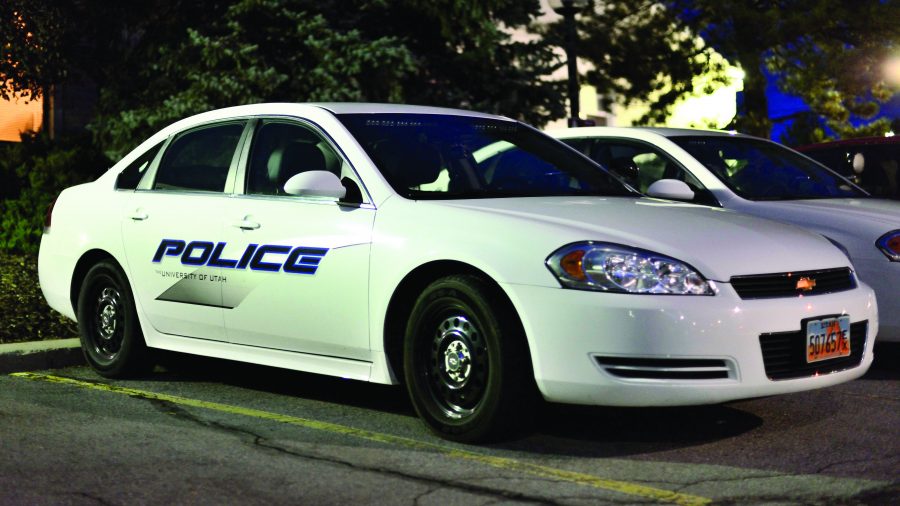Calls For A Safety Escort Climbed By 83% This Past Year. Do Students Feel Safe On Campus?
University of Utah Police cars | Chronicle archives.
September 8, 2019
It has come to our attention that the data used in this story is not accurate. We are currently working to address the issue.
A tangerine energy drink sits alongside a colorful sprawl of folders and pens on a study table for Nina Borzoni and Pauline Kneller, both juniors. It’s almost 10 p.m., and in the back of their minds, they’re making sure they get home safely after studying.
Campus safety has become to one of the highest concerns for students at the University of Utah. This worry has been fueled by the killings of U students Lauren McCluskey, a senior, last year and ChenWei Guo, a freshman, in 2017. While Mackenzie Lueck, a junior, was killed off-campus earlier this summer, the case also contributed to how the university protects students and the concerns of security from the student body.
The U has announced that it is amping up further safety initiatives for students on campus through an investment of almost $1 million. The Presidential Task Force on Campus Safety has released a 30-point plan to create a safer and more secure campus for students and employees. These points include adjusting evening classes to be conducted in area clusters, funding self-defense workshops and developing an active shooter online training course.
The task force also recommended that the university creates a geo-fence for its campus to ensure that everyone with a phone receives campus-wide alerts if they’re not already enrolled to receive emergency text messages.
With the recent advent of the U building a safer campus community, The Daily Utah Chronicle obtained records from the Department of Public Safety to look at a service students are often encouraged and advised by the university to utilize — safety escorts.
Safety escorts operate as a no-questions-asked service for any student, faculty member, employee or U-adjacent individual to call for a free ride anywhere on campus by a security officer. It takes an average of eight minutes for an officer to reach the individual, which is one more minute from their estimated travel time according to the Campus Safety website.
Looking at calls in the past two years, beginning on Aug. 28, The Chronicle tracked and visualized the data of escort service requests.
A month after Guo’s death, calls requesting an escort shot up by 40%. After dipping slightly during winter break, when the campus is largely absent of U students and employees, requests soared again in the spring of 2018.
“When the first shooting happened, I lived in Chapel Glen,” Kneller said, referring to the dorms that stood across the street from the incident. At the time, the murder collectively shocked members of the U community, generating international news. Two months into his first year, Guo often dreamt of starting a consulting firm upon graduation.
Nearly a year after, on Oct. 22, McCluskey, known for her athletic and intellectual talents, was shot and killed.
McCluskey’s death forcefully shined a light on the vulnerabilities of campus protections for students. It was found later she made multiple calls to the U’s campus police reporting the case before the night of her killing. Police officers received immense criticism on their handling of her case.
The parents of McCluskey have filed a $56 million lawsuit against the U. The suit claims that the institution failed to protect their daughter by not taking responsibility or enacting a rigorous enough response towards McCluskey’s case.
Some of these shortfalls to protect McCluskey include a now-fired detective who refused to take her case seriously and not performing a full background check on Melvin Rowland — the man she briefly dated before finding out he was a convicted sex offender.
Calls for an escort skyrocketed after the homicide, spurring a large cultural change for students, along with shared grief.
Many variables are involved that could explain why requests rose in a short period of time. It’s important to note student population rose by almost 1% since 2017, which might be a factor in explaining the sharp ascent. Another consideration is awareness. Most university press releases and texts regarding safety have discussed the escort system, and the murders of Guo and McCluskey may have publicized this option to a larger percentage of the U community.
It would be inaccurate to say the murder of these students caused an uproar of summoning exports, but there is a visible correlation between these events and the upward trends.
Borzoni, a health promotion major, refuses to take night classes and has enrolled most of her courseload online to avoid the idea of walking through campus late at night alone.
She emphasized just how risky walking at night is on the large campus. “I spend more time worrying about how am I going to get to this place on campus than I do worrying about how I don’t understand my homework,” Borzoni said.
Kneller has called a security escort three times, and it typically took around 15 minutes for the officer to arrive at the Marriott library. Though the process was professional and straightforward, Kneller found it uncomfortable to wait outside the closed library by herself in dim lighting. “I always carry pepper spray and a pocketknife with me at all times,” she said. “You just can’t afford not to on campus anymore.”
This past April, the number of calls to safety escorts increased to rates similar to those during the month of November, after McCluskey’s death. After a U alert warned students of a possible sexual assault on campus nearby Rice-Eccles Stadium on April, calls for an escort increased.
In the summer, after Lueck was declared missing by the Salt Lake City Police Department, the U once again attracted the national spotlight. The case inspired attention, scrutiny and more media focus, including some coverage that was deemed insensitive. Barstool Sports, a popular website for the college crowd, published an article sexualizing Lueck — hours before Salt Lake City’s Police Chief Mike Brown announced her murder. The article since then has been taken down and contributor has been fired.
Recently, calls have slowed down, likely because less students are on campus during the summer session. It is not yet clear if there will be a noticeable uptick for this academic year.
This year, the U has rolled out a SafeRide program. After 6 p.m., anyone affiliated with the U can download an app to “hail” a ride to take them anywhere on campus. Administrators hope that this app will be convenient and familiar for young adults used to using rideshares like Lyft or Uber, assuaging any fears of using the service.
Borzoni is skeptical of this move. She pointed out that a moderate amount of students may not possess a smartphone to engage in this new initiative, possibly limiting access to those who need it most. “I voiced these concerns to the Safety Task Force and they were not that much concerned,” she said. Borzoni also disagrees with the idea of a student employee driving another student to their destination, which could potentially set up a situation larger than the employee’s oversight.
Both believe a shift in infrastructure on school grounds can shape the U’s safety culture. They recommend furthering the blue light system, tall black towers that directly calls for campus police assistance in emergencies. “Everyone will feel so much safer, and everyone would be so much safer,” Borzoni said.
Expecting to graduate next year, Borzoni says she hopes this semester is finally different. “I remember walking into this year — it was kind of a morbid thought — but being like, wow, I hope this doesn’t happen for the third year in a row,” she said.
Before returning to their homework, hoping to finish before it got too late, Borzoni and Kneller both deployed a send-off most students are finding all too familiar during dark nights on campus — “Please be safe.”









Brad Davis • Sep 11, 2019 at 7:58 am
Nice white wash job. Why don’t you look more closely at what really happened? Like how the chief, the deputy chief and the former detective sergeant left town during the week of McCluskey’s murder.